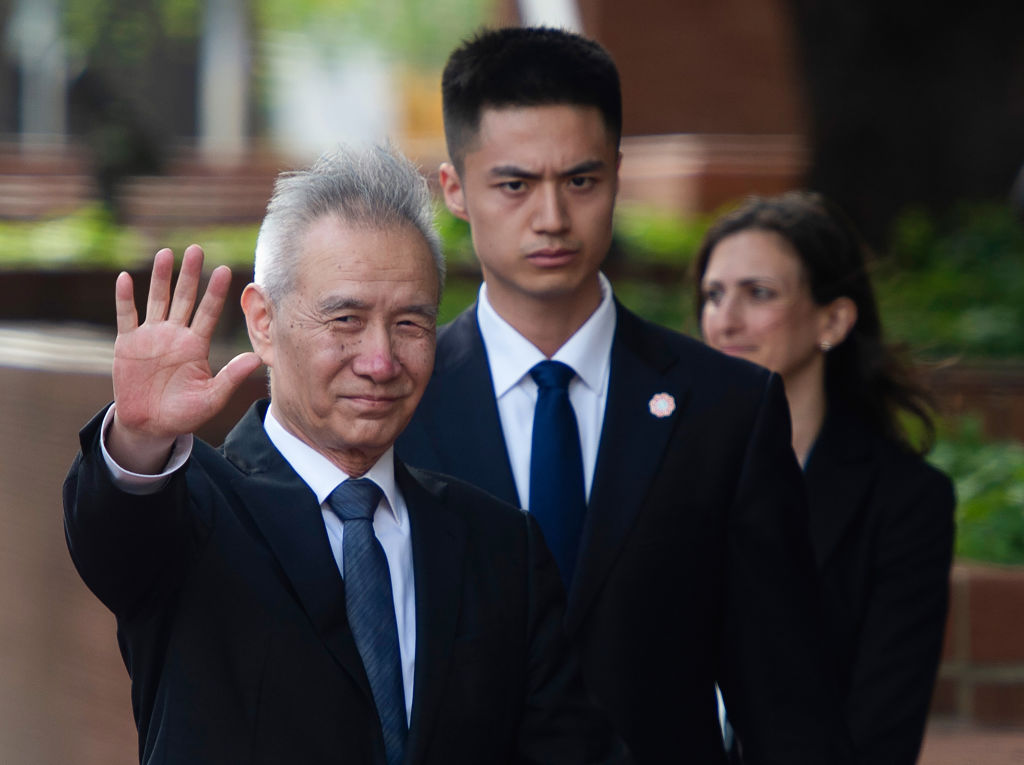Trump imposes new tariffs on $200 billion of Chinese imports in the middle of trade talks


A free daily email with the biggest news stories of the day – and the best features from TheWeek.com
You are now subscribed
Your newsletter sign-up was successful
President Trump's threatened 25 percent tariff on $200 billion worth of Chinese exports took effect at 12:01 a.m. Friday, halfway through high-level trade talks in Washington, D.C., led by Chinese Vice Premier Liu He. The tariffs, up from 10 percent, will be in force for shipments leaving China on Friday, so there is still a little time to work out a last-minute agreement. Both sides agreed the trade talks will continue Friday, as planned.
China's Commerce Ministry said it "deeply regrets" Trump's decision and Beijing "will have to take necessary countermeasures." A ministry spokesman added, "We hope that the U.S. and China will meet each other halfway and make joint efforts to solve the existing problems through cooperation and consultation." U.S. officials said the trade talks were progressing smoothly until China sent over significant edits over the weekend, prompting Trump's tariff threat.
Equalizing the trade imbalance with China was one of Trump's big campaign themes, and "U.S. officials said Trump's 'America First' stance rocked Chinese leaders and halted the erosion of American manufacturing and technology industries by Chinese trade practices," The Washington Post notes. But the tariffs — those imposed by Trump and the retaliatory tariffs from China — are hurting both countries, economists say.
The Week
Escape your echo chamber. Get the facts behind the news, plus analysis from multiple perspectives.

Sign up for The Week's Free Newsletters
From our morning news briefing to a weekly Good News Newsletter, get the best of The Week delivered directly to your inbox.
From our morning news briefing to a weekly Good News Newsletter, get the best of The Week delivered directly to your inbox.
On the U.S. side, U.S.-based companies pay Trump's tariffs and pass much of that cost onto consumers, and China's retaliatory tariffs are harming U.S. agriculture and many large industries. A study in March from the World Bank's chief economist and colleagues from UCLA, UC-Berkeley, and Columbia Business School found that "workers in very Republican counties bore the brunt of the costs of the trade war, in part because retaliations disproportionately targeted agricultural sectors." Read The Week's Jeff Spross explain why Trump may have the upper hand on China anyway.
A free daily email with the biggest news stories of the day – and the best features from TheWeek.com
Peter has worked as a news and culture writer and editor at The Week since the site's launch in 2008. He covers politics, world affairs, religion and cultural currents. His journalism career began as a copy editor at a financial newswire and has included editorial positions at The New York Times Magazine, Facts on File, and Oregon State University.
-
 Political cartoons for February 15
Political cartoons for February 15Cartoons Sunday's political cartoons include political ventriloquism, Europe in the middle, and more
-
 The broken water companies failing England and Wales
The broken water companies failing England and WalesExplainer With rising bills, deteriorating river health and a lack of investment, regulators face an uphill battle to stabilise the industry
-
 A thrilling foodie city in northern Japan
A thrilling foodie city in northern JapanThe Week Recommends The food scene here is ‘unspoilt’ and ‘fun’
-
 TikTok secures deal to remain in US
TikTok secures deal to remain in USSpeed Read ByteDance will form a US version of the popular video-sharing platform
-
 Unemployment rate ticks up amid fall job losses
Unemployment rate ticks up amid fall job lossesSpeed Read Data released by the Commerce Department indicates ‘one of the weakest American labor markets in years’
-
 What a rising gold price says about the global economy
What a rising gold price says about the global economyThe Explainer Institutions, central banks and speculators drive record surge amid ‘loss of trust’ in bond markets and US dollar
-
 US mints final penny after 232-year run
US mints final penny after 232-year runSpeed Read Production of the one-cent coin has ended
-
 Warner Bros. explores sale amid Paramount bids
Warner Bros. explores sale amid Paramount bidsSpeed Read The media giant, home to HBO and DC Studios, has received interest from multiple buying parties
-
 Gold tops $4K per ounce, signaling financial unease
Gold tops $4K per ounce, signaling financial uneaseSpeed Read Investors are worried about President Donald Trump’s trade war
-
 Electronic Arts to go private in record $55B deal
Electronic Arts to go private in record $55B dealspeed read The video game giant is behind ‘The Sims’ and ‘Madden NFL’
-
 New York court tosses Trump's $500M fraud fine
New York court tosses Trump's $500M fraud fineSpeed Read A divided appeals court threw out a hefty penalty against President Trump for fraudulently inflating his wealth
